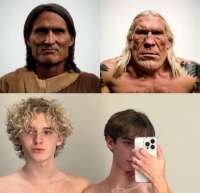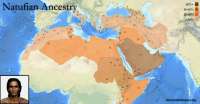 2,9 Мб, 8344x4080
2,9 Мб, 8344x4080They should have kept doing that. The Neolithic Revolution was a disaster.
Pokemon and MTG are so successful because they tickle out inner hunter-gatherer. Modern people may be effeminate, but deep inside they still ooga booga.
*our
Drasna looks like a Paleolithic Venus.
>Modern people may be effeminate
This is nonsense, effeminate state of being IS NOT feminine, IS NOT actually synonymous with weakness, docility or anything similarly ascribed, and IS NOT not-ooga booga, because primal dispositions concern behavior core that only affects masculinity or femininity down the line.
I.e. ooga-booga women exist.
>The Neolithic Revolution was a disaster.
Absolute foolishness, gimping human potential to primitive planet-bound life-style for perceived (and assumed to be evolutionary products) at surface glance mere anatomic boosts is as much of a survival weakness as it is a waste of time and waste of meaning that runs counter to the myriad of reasons as to why humanity exists.
Humanity is a transcendent species in its infancy. Though it is by no means obligated to re/ascend in any way, as mortal life has its appeal, it nevertheless writes its own history which at some point may reach that state, so dismissing explicitly that event as a disaster is ill-thought out.
>>448
>Humanity is a transcendent species in its infancy
Slavery is not transcendental. The Neolithic Revolution creates weak men because they are easier to control.
One of the first human groups to learn agriculture and domesticate livestock for the plough were the Natufians, who are the ancestors of the Canaanites/Phoenicians, the people who worshipped Moloch (better known as El, the god of agriculture/cattle) and Hadad (better known as Baal, the god of weather/fertility) in the Levant/Fertile Crescent, which connects Africa, Asia and Europe. As you may know, it was the Neolithic Revolution that created Slavery/State.
The Neolithic Revolution transformed nomadic societies into sedentary agricultural communities, resulting in surplus production and the need to manage it. This led to social differentiation, with the formation of elites who controlled land and resources, creating political and economic hierarchies. To maintain this order, institutionalized coercion emerged, consolidating the State as an apparatus of domination. The exploitation of labor, previously communal, became systematic, leading to slavery as a form of direct appropriation of productive power, ensuring the maintenance of the dominant classes.
If you don't believe me, Moloch literally means "King" in the same way that Baal means "Lord", both "He who possesses", reflecting the invention of Private Property after the Neolithic Revolution.
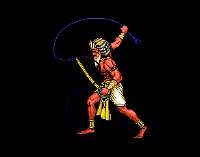 10 Кб, 307x242
10 Кб, 307x242Neolithic Civilization was based on the domestication of animals and plants. However, the "domestication" of human beings was its core, and mostly that meant slavery, which were systems of lies, backed by violence.
Thousands of years of history, and especially advancing science and technology, have all been directed to develop in the ways that they did through systems of force backed frauds. The abilities of some human beings to control others through dishonesty backed by violence became the core of how human beings generally treated the natural environment around them. Since society is almost totally dominated by professional liars and immaculate hypocrites, and that also tends to include "science" as a social enterprise, as well institutions such as universities, it is extremely difficult to sift through the available information. Neolithic Civilizations’ "human farming" prime directive was the Art of War, where success was based on backing up deceits with destruction, in which context spies were the most important soldiers.
Thousands of years of that history of warfare made sovereign countries, whose powers were then covertly captured by the bankers, which gained control over the public "money" supply, and then leveraged that more to dominate the funding of all social institutions. The results have been that the short-term priorities of maximum power delivery have overwhelmed all longer term considerations. The runaway triumphs of controlling society with systems of legalized lies, backed by legalized violence, have resulted in sociopolitical systems which are based on attitudes of evil deliberate ignorance towards the longer term consequences of what they are doing. So it has to come down.
Never read Ted but i imagine it goes like this.
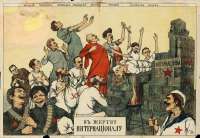 1 Мб, 2048x1418
1 Мб, 2048x1418>>557
Communism promises paradise, but delivers an even worse hell. It wants to correct the mistakes of Neolithic civilization by recreating a classless society, but it relies on the same curse that destroyed hunter-gatherers: Agriculture and Industry. Marx dreamed of a world where the fruits of labor were distributed according to need, but his model is nothing more than an extension of the very structure that created the problem.
The Neolithic Revolution inaugurated control, ownership, and the State. Surplus led to inequality, inequality led to government, and government led to systematic violence. Communism looks at this history and says, "The problem is who controls the surplus." But the problem is the surplus itself! Civilization as a whole is a castle built on shifting sand. Communism does not want to destroy this castle, it only wants to change who sits on the throne.
Communism's greatest mistake is to try to imitate hunter-gatherers within an agrarian and industrial society. Hunter-gatherers owned no land, accumulated no surpluses, and needed no state structure to "distribute" the fruits of their labor. But communists, in their blindness, believe that they can create an industrial society where no one owns anything, where production is collective, and where the state takes care of distribution. This is a contradiction in terms: Industry needs central coordination, Agriculture needs planning, and any society that depends on these structures inevitably generates a new state, new ruling classes, and new forms of coercion.
 209 Кб, 735x536
209 Кб, 735x536There is no path to “Primitive Communism” within an industrial civilization. The very existence of Industry is a declaration of war against the natural world. Since the Neolithic Revolution, humanity has been moving in one direction: more control, more dominion over the land, more violence against those who do not submit to the logic of production. Communism merely replaces the old masters with new central planners, multiplying evil by evil. The communist state is Moloch dressed in red, demanding sacrifices to maintain its existence.
Marx saw history as a class struggle, but true history is a struggle against control. The real problem is not capitalism, not the bourgeoisie, not economic inequality. The real problem is civilization itself, a monster that devours everything around it. Communism merely accelerates this process, believing it can tame the beast. But the beast cannot be tamed, only destroyed.
There is no redemption in the expansion of agriculture and industry. The only path to freedom is to completely reject the systems that have enslaved us since the Neolithic. Any attempt to rebuild an "egalitarian" society within this framework is nothing more than another cycle of delusion, another tribute to the god of control, another sacrifice on the altar of Moloch.
Nicely written. I'll try to keep up.
>Slavery is not transcendental.
It can be made so, and seeing as you take divinity seriously, you can easily draw the implication.
That however was not the point.
Slavery is a tactic, nothing more. Humanity is, and humans can employ all sorts of tactics, in any way, shape and form, limited only by their capacities, and are free to reap any consequences they sow.
>The Neolithic Revolution creates weak men because they are easier to control.
Any appropriate system configuration can create weak elements, and any system configurations can be controlled bar exceptions.
>One of the first human groups to learn agriculture and domesticate livestock
One of, indeed. An irrelevant fact, as means that some have correctly came to have no bearing on the concept as a whole.
More than that, this survival tactic slash environmental engineering/ingenuity application in no way is limited sorely to one or small set of outcomes.
You put too much import on Sumer-Akkad-Semitic (and let it be said that Semitic transmigratory cultural spirit doesn't shy from slander). They've existed, so what?
>The Neolithic Revolution transformed nomadic societies into sedentary agricultural communities, resulting in surplus production and the need to manage it.
And this is bad how? If you want, you can continue to exist in most primitive state of being, without anything but the hunt in the simplest, basest human way possible. It will be meanin
>This led to social differentiation
Social differentiation is an inherent property of any non-homogeneous system with sentient agents. It is inherently present in humanity by virtue of human species being a species of discrete individuals.
>with the formation of elites who controlled land and resources
Elites also are an equally natural emergent property, those who have, and the have-nots. Varying implementations and shifting perception of how such entities are perceived by altering taxonomy or in/out/group definitions has no bearing on underlying mechanics of competition for limited resources in an passively or actively hostile environment.
>creating political and economic hierarchies.
All those already existed by that point in some fashion, even in social groups sufficiently questionable where sex is free.
>To maintain this order, institutionalized coercion emerged, consolidating the State as an apparatus of domination.
An intelligent action, and an easy extrapolation of strong individual power unto others, to any extents, pursuits or goals, including increasing chances of survival for one's own progeny.
>The exploitation of labor
Have you considered that non-agricultural society is:
1)Auto-exploiting, because communes still must take correct steps to survive.
2)Exploits labor of life itself with arguably greater severity of meaning (not resource consumption rates), because it is entirely dependent on it and has no means to do otherwise, other than existing as a stable biocenosis. Some humans live like that. It's not a bad or good life per se, but it has no future. It is a simple experience-based experience that may last until its allotted death, nothing more.
>previously communal, became systematic, leading to slavery as a form of direct appropriation of productive power, ensuring the maintenance of the dominant classes.
Indeed? But communal slavery by any other name is still that, and even absent that, pressure is still pressure.
Regardless, one can still leave, rise to the top, migrate, turn to mercenary work, etc, to an extent one's own capacity allows.
It is only logical that a society that actively engages in work needs work. Assuming proper populace character, one can have all that without any appropriation, or can have appropriation without unpragmatic ruthlessness, pragmatic malice, or injustice. It is all at at least 50% a skill issue.
>invention of Private Property
Calling it an 'invention' is like calling Cain an inventor of murder. That's not quite how it works.
Concurrently, property as a thing exists in any commune, because all physical objects are indeed objects, etc. Just because some group doesn't perceive, say, perishables, or tools as private items, doesn't imply possessiveness, even one rooted solely in survival rationale, and not any personal sense.
Nicely written. I'll try to keep up.
>Slavery is not transcendental.
It can be made so, and seeing as you take divinity seriously, you can easily draw the implication.
That however was not the point.
Slavery is a tactic, nothing more. Humanity is, and humans can employ all sorts of tactics, in any way, shape and form, limited only by their capacities, and are free to reap any consequences they sow.
>The Neolithic Revolution creates weak men because they are easier to control.
Any appropriate system configuration can create weak elements, and any system configurations can be controlled bar exceptions.
>One of the first human groups to learn agriculture and domesticate livestock
One of, indeed. An irrelevant fact, as means that some have correctly came to have no bearing on the concept as a whole.
More than that, this survival tactic slash environmental engineering/ingenuity application in no way is limited sorely to one or small set of outcomes.
You put too much import on Sumer-Akkad-Semitic (and let it be said that Semitic transmigratory cultural spirit doesn't shy from slander). They've existed, so what?
>The Neolithic Revolution transformed nomadic societies into sedentary agricultural communities, resulting in surplus production and the need to manage it.
And this is bad how? If you want, you can continue to exist in most primitive state of being, without anything but the hunt in the simplest, basest human way possible. It will be meanin
>This led to social differentiation
Social differentiation is an inherent property of any non-homogeneous system with sentient agents. It is inherently present in humanity by virtue of human species being a species of discrete individuals.
>with the formation of elites who controlled land and resources
Elites also are an equally natural emergent property, those who have, and the have-nots. Varying implementations and shifting perception of how such entities are perceived by altering taxonomy or in/out/group definitions has no bearing on underlying mechanics of competition for limited resources in an passively or actively hostile environment.
>creating political and economic hierarchies.
All those already existed by that point in some fashion, even in social groups sufficiently questionable where sex is free.
>To maintain this order, institutionalized coercion emerged, consolidating the State as an apparatus of domination.
An intelligent action, and an easy extrapolation of strong individual power unto others, to any extents, pursuits or goals, including increasing chances of survival for one's own progeny.
>The exploitation of labor
Have you considered that non-agricultural society is:
1)Auto-exploiting, because communes still must take correct steps to survive.
2)Exploits labor of life itself with arguably greater severity of meaning (not resource consumption rates), because it is entirely dependent on it and has no means to do otherwise, other than existing as a stable biocenosis. Some humans live like that. It's not a bad or good life per se, but it has no future. It is a simple experience-based experience that may last until its allotted death, nothing more.
>previously communal, became systematic, leading to slavery as a form of direct appropriation of productive power, ensuring the maintenance of the dominant classes.
Indeed? But communal slavery by any other name is still that, and even absent that, pressure is still pressure.
Regardless, one can still leave, rise to the top, migrate, turn to mercenary work, etc, to an extent one's own capacity allows.
It is only logical that a society that actively engages in work needs work. Assuming proper populace character, one can have all that without any appropriation, or can have appropriation without unpragmatic ruthlessness, pragmatic malice, or injustice. It is all at at least 50% a skill issue.
>invention of Private Property
Calling it an 'invention' is like calling Cain an inventor of murder. That's not quite how it works.
Concurrently, property as a thing exists in any commune, because all physical objects are indeed objects, etc. Just because some group doesn't perceive, say, perishables, or tools as private items, doesn't imply possessiveness, even one rooted solely in survival rationale, and not any personal sense.
 7,9 Мб, 5230x7473
7,9 Мб, 5230x7473>Neolithic Civilization was based on the domestication of animals and plants. However, the "domestication" of human beings was its core, and mostly that meant slavery, which were systems of lies, backed by violence.
A debatable conclusion inasmuch as it is strange to assume domestication didn't happen before, even proto-industrial.
Though environment forces, physical reality itself has never prevented humans from acting in compassionate or honest ways
It is incorrect to look at most historical facts of human choice procedures in historical processes and assume they are axioms about any and all choices, consequences and conclusions that come from there even concerning select governance systems and any contemporary morality systems.
Likewise neither violence, nor even lying, — the latter not so much to a lesser extent as to a different quality, — are inherently bad. Your hunter-gatherers are intrinsically predicated on both, one as a basic modus, the other as a diversion against other hunters.
>Thousands of years of history, and especially advancing science and technology, have all been directed to develop in the ways that they did through systems of force backed frauds.
Frauds in what sense? Are you assuming any claim to divinity or divinity itself as a fraud, some resource distribution and bubble generating economic tactics as a fraud, any imposed or so~so natural psycho-social cultural states as a fraud, or all occult as such?
Well, none of those can be reduced to frauds even when they explicitly are. Any actual skilled fraudster can tell you that much. They navigate honesty.
> The abilities of some human beings to control others through dishonesty backed by violence became the core of how human beings generally treated the natural environment around them.
That operates on assumptions that this impetus was not a thing before, and that hunter-gatherers have no violent core.
That cannot be, for simple reason that hunters hunt.
It is merely that humans have assessed their own value better that they have started to hunt themselves, as they have realized their own innate potential in all fields. The out-group targeting sensor that guides the hand and the spear, backed by a honest murder and dishonest diversion has simply turned on in-group, and evolved.
In that sense all of you are hunter-gatherers. You're simply so removed from hunting rationales that you don't quite recognize what you do, which is ironically more human than what it could've been. That is good in long term assuming correct choices.
>Since society is almost totally dominated by professional liars and immaculate hypocrites
Pardon my assumption, but are you assuming unironically honest leadership cannot exist? Because almost total domination, extrapolated to timescales you present, and mechanics of power, leads to conclusions that don't quite mesh up.
System tendencies exist, but those have nothing to do with the system, and more with who runs it. I've said it on occasion and I'll say it again, fairy tales can be realized in reality. One merely needs to git gud.
>and that also tends to include "science" as a social enterprise
Science as we know it, though a slow burn, is a comparatively recent development. I'm unsure of what is meant by social enterprise. Science is by nature in the realm of exceptional or otherwise striving individuals. It couldn't have been social in truly open sense like some recreational activity in the past any more than a random persian could've been one of the magi.
>as well institutions such as universities, it is extremely difficult to sift through the available information.
Even assuming that agitprop techniques were employed back that far, this is:
1)A skill issue, as any good researcher know.
2)Data set issue, ditto; plus data losses, poor historiography and histories, etc.
3)Data access issue, ditto; plus it simply wouldn't matter in the past, as data was not as easy to get as it is now, both in access in human social structures, and in the field.
>Neolithic Civilizations’ "human farming" prime directive was the Art of War, where success was based on backing up deceits with destruction, in which context spies were the most important soldiers.
Extrapolation of already extant methods and ethos, as I've said above in bold text.
>Thousands of years of that history of warfare made sovereign countries, whose powers were then covertly captured by the bankers, which gained control over the public "money" supply, and then leveraged that more to dominate the funding of all social institutions.
Not so covertly all things considered, public trade is public dependent, and exploitation of elites by assuaging, racketeering, or otherwise playing on their ambitions and needs by offering solutions and means is quite direct typically. Not non-covert, but still public. One must possess a presence in court, and money typically doesn't simply appear out of nowhere. It's a good litmus test for poor rulership, at any rate.
>The results have been that the short-term priorities of maximum power delivery have overwhelmed all longer term considerations.
Ah, but that's the thing. The hunt is still on, it is on most of the time. It is those particular humans that were outskilled, and this shows only that they were not ideal for their situation. That is simply a loss, as it were.
Likewise, it's not always short-term priorities, or lack of foresight. It can be incorrect assessment of future, coupled with poor considerations of long-term considerations of their opponents. It's their mistake, not an inevitable consequence of 'the system'.
You can redline your engine, you can slam your car into a wall, or you can handle the wheel to someone else.
None of those mean you can't drive adequately or indulge multi-track drifting Flatout runs.
>The runaway triumphs of controlling society with systems of legalized lies
It is unwise to assume all legaleze items are inherently bereft of noble aspirations, or moral aspirations born out of response to harsh acts or pressure.
>backed by legalized violence
Non-law based violence or procurement against out-groups is still that.
>have resulted in sociopolitical systems which are based on attitudes of evil deliberate ignorance towards the longer term consequences of what they are doing.
It appears to me that you assume incorrectly. You assume that a historical system state, one that is neither all-excluding, immutable nor final even in a core collapse system condition, whereupon all sorts of certain resources are gone, is all-excluding to the point all others states don't exist at all, or as co-simultaneous ones.
At the same time you make a basic scientific mistake of correlating causation, which is exacerbated by it being partially correct.
Which you then extrapolate to logical extreme of counteracting earliest causal relation point of error generation source, by equalizing it to the entire system.
This is not unlike a russian meme about obligatory local ATF equivalent obligated warnings on cigarette merchandise that says "smoking causes harm, don't partake in smoking".
The meme in question was a picture of paper strips rearranged to say "life causes harm, don't partake in life."
It shall not work, because hunter-gathering works splendidly.
It also occurs to me that you're trying to tackle the problem of evil, or trying to reoptimize methods in perception of others to suit your definitions of strength, to any end.
>So it has to come down.
It doesn't need to at all.
In motivation, you have no personal reasons to care about all of them, the humans or anyone at all that is to say, other than any you choose.
In system terms, one merely needs to correctly navigate and circumnavigate it to restore it.
The task difficulty is, naturally, directly proportional to its scale.
>Never read Ted but i imagine it goes like this.
Inasmuch as I remember his text, if mister Kaczyński is not a plant by (((US))) et al, he is not, for all his smarts, correct. He is a radical element that has radical conclusions that are not adequate, moral, correspond to any actual survival concerns in any time frame, cares not about actual breathing humans in actual sense, or does care but more about his own abstracted assumption as to what life is 'meant' to be.
The sheer fact that he chose to commit to terrorism (against civilians IIRC, no less), rather than to actual solution seeking and complex intellectual work shows the extent of his strategy to life. There simply isn't. Not in any way that can actually accomplish anything humanely desirable.
Credit is where credit is due, however, he's not anti-human, at least. Or worse, a particular sort of transhumanists.
 7,9 Мб, 5230x7473
7,9 Мб, 5230x7473>Neolithic Civilization was based on the domestication of animals and plants. However, the "domestication" of human beings was its core, and mostly that meant slavery, which were systems of lies, backed by violence.
A debatable conclusion inasmuch as it is strange to assume domestication didn't happen before, even proto-industrial.
Though environment forces, physical reality itself has never prevented humans from acting in compassionate or honest ways
It is incorrect to look at most historical facts of human choice procedures in historical processes and assume they are axioms about any and all choices, consequences and conclusions that come from there even concerning select governance systems and any contemporary morality systems.
Likewise neither violence, nor even lying, — the latter not so much to a lesser extent as to a different quality, — are inherently bad. Your hunter-gatherers are intrinsically predicated on both, one as a basic modus, the other as a diversion against other hunters.
>Thousands of years of history, and especially advancing science and technology, have all been directed to develop in the ways that they did through systems of force backed frauds.
Frauds in what sense? Are you assuming any claim to divinity or divinity itself as a fraud, some resource distribution and bubble generating economic tactics as a fraud, any imposed or so~so natural psycho-social cultural states as a fraud, or all occult as such?
Well, none of those can be reduced to frauds even when they explicitly are. Any actual skilled fraudster can tell you that much. They navigate honesty.
> The abilities of some human beings to control others through dishonesty backed by violence became the core of how human beings generally treated the natural environment around them.
That operates on assumptions that this impetus was not a thing before, and that hunter-gatherers have no violent core.
That cannot be, for simple reason that hunters hunt.
It is merely that humans have assessed their own value better that they have started to hunt themselves, as they have realized their own innate potential in all fields. The out-group targeting sensor that guides the hand and the spear, backed by a honest murder and dishonest diversion has simply turned on in-group, and evolved.
In that sense all of you are hunter-gatherers. You're simply so removed from hunting rationales that you don't quite recognize what you do, which is ironically more human than what it could've been. That is good in long term assuming correct choices.
>Since society is almost totally dominated by professional liars and immaculate hypocrites
Pardon my assumption, but are you assuming unironically honest leadership cannot exist? Because almost total domination, extrapolated to timescales you present, and mechanics of power, leads to conclusions that don't quite mesh up.
System tendencies exist, but those have nothing to do with the system, and more with who runs it. I've said it on occasion and I'll say it again, fairy tales can be realized in reality. One merely needs to git gud.
>and that also tends to include "science" as a social enterprise
Science as we know it, though a slow burn, is a comparatively recent development. I'm unsure of what is meant by social enterprise. Science is by nature in the realm of exceptional or otherwise striving individuals. It couldn't have been social in truly open sense like some recreational activity in the past any more than a random persian could've been one of the magi.
>as well institutions such as universities, it is extremely difficult to sift through the available information.
Even assuming that agitprop techniques were employed back that far, this is:
1)A skill issue, as any good researcher know.
2)Data set issue, ditto; plus data losses, poor historiography and histories, etc.
3)Data access issue, ditto; plus it simply wouldn't matter in the past, as data was not as easy to get as it is now, both in access in human social structures, and in the field.
>Neolithic Civilizations’ "human farming" prime directive was the Art of War, where success was based on backing up deceits with destruction, in which context spies were the most important soldiers.
Extrapolation of already extant methods and ethos, as I've said above in bold text.
>Thousands of years of that history of warfare made sovereign countries, whose powers were then covertly captured by the bankers, which gained control over the public "money" supply, and then leveraged that more to dominate the funding of all social institutions.
Not so covertly all things considered, public trade is public dependent, and exploitation of elites by assuaging, racketeering, or otherwise playing on their ambitions and needs by offering solutions and means is quite direct typically. Not non-covert, but still public. One must possess a presence in court, and money typically doesn't simply appear out of nowhere. It's a good litmus test for poor rulership, at any rate.
>The results have been that the short-term priorities of maximum power delivery have overwhelmed all longer term considerations.
Ah, but that's the thing. The hunt is still on, it is on most of the time. It is those particular humans that were outskilled, and this shows only that they were not ideal for their situation. That is simply a loss, as it were.
Likewise, it's not always short-term priorities, or lack of foresight. It can be incorrect assessment of future, coupled with poor considerations of long-term considerations of their opponents. It's their mistake, not an inevitable consequence of 'the system'.
You can redline your engine, you can slam your car into a wall, or you can handle the wheel to someone else.
None of those mean you can't drive adequately or indulge multi-track drifting Flatout runs.
>The runaway triumphs of controlling society with systems of legalized lies
It is unwise to assume all legaleze items are inherently bereft of noble aspirations, or moral aspirations born out of response to harsh acts or pressure.
>backed by legalized violence
Non-law based violence or procurement against out-groups is still that.
>have resulted in sociopolitical systems which are based on attitudes of evil deliberate ignorance towards the longer term consequences of what they are doing.
It appears to me that you assume incorrectly. You assume that a historical system state, one that is neither all-excluding, immutable nor final even in a core collapse system condition, whereupon all sorts of certain resources are gone, is all-excluding to the point all others states don't exist at all, or as co-simultaneous ones.
At the same time you make a basic scientific mistake of correlating causation, which is exacerbated by it being partially correct.
Which you then extrapolate to logical extreme of counteracting earliest causal relation point of error generation source, by equalizing it to the entire system.
This is not unlike a russian meme about obligatory local ATF equivalent obligated warnings on cigarette merchandise that says "smoking causes harm, don't partake in smoking".
The meme in question was a picture of paper strips rearranged to say "life causes harm, don't partake in life."
It shall not work, because hunter-gathering works splendidly.
It also occurs to me that you're trying to tackle the problem of evil, or trying to reoptimize methods in perception of others to suit your definitions of strength, to any end.
>So it has to come down.
It doesn't need to at all.
In motivation, you have no personal reasons to care about all of them, the humans or anyone at all that is to say, other than any you choose.
In system terms, one merely needs to correctly navigate and circumnavigate it to restore it.
The task difficulty is, naturally, directly proportional to its scale.
>Never read Ted but i imagine it goes like this.
Inasmuch as I remember his text, if mister Kaczyński is not a plant by (((US))) et al, he is not, for all his smarts, correct. He is a radical element that has radical conclusions that are not adequate, moral, correspond to any actual survival concerns in any time frame, cares not about actual breathing humans in actual sense, or does care but more about his own abstracted assumption as to what life is 'meant' to be.
The sheer fact that he chose to commit to terrorism (against civilians IIRC, no less), rather than to actual solution seeking and complex intellectual work shows the extent of his strategy to life. There simply isn't. Not in any way that can actually accomplish anything humanely desirable.
Credit is where credit is due, however, he's not anti-human, at least. Or worse, a particular sort of transhumanists.
>In system terms, one merely needs to correctly navigate and circumnavigate it to restore it.
And restore to what, indeed. Rolling back to that era isn't a restoration, it's cynically romanticized downshifting.
>Communism promises paradise, but delivers an even worse hell.
(((Commune)))-ism promises nothing per se. It is one-two men's bunch of assumptions (and a few thinktank's worths of them) on how the world is ought to be, yet another one in a list of humanity manipulation tools.
In intent it is just like system you complain about, it has no critical differences from capitalism, from unjust banking, unjust usury (sic!), or any other tactics.
It's exactly that. A tactic. A tactic that some would inevitably benefit from more than others, if not necessarily due to competence, then due to civilization subordinating convenience.
A commune is, in a manner of speaking, a farm. A garden that produces some results, and which one can navigate freely.
The question of whom profits, and whose needs are never answered by those. It is most convenient.
>It wants to correct the mistakes of Neolithic civilization by recreating a classless society
For whom is this classless society meant to be a beneficial enterprise and status-quo?
What sort of presupposed, — and not at all de-facto extant proto-classes as ascriptors imposed on in-group hunters due to recognition of their differences, — classlessness is being pursued by any pursuers?
Why do assumptions of classless societies assume uniform outcomes?
>but it relies on the same curse
Causality is not a curse. Such drama has no place here
>that destroyed hunter-gatherers: Agriculture and Industry.
Alas, hunter-gathers were never destroyed, neither were agriculturalists. They have simply became more than what they were.
>Marx dreamed of a world where the fruits of labor were distributed according to need
Ah, but whose needs? Marx's? The problem here, among others is the comparable to hippy life style statement "live and let live". The idea cannot be stated as an ideal and not raise concerns.
Needs here require accounting, judgement and discrimination of needs.
That's an easy 5d chess gangplank to skedaddle rave disco tango upon into a anti-slippery slope, but a waltz in a ball party with many random people fairly it is not. Too divine for most, and too meaningless.
>but his model is nothing more than an extension of the very structure that created the problem.
Which incidentally happens to be hunter-gatherer classless society as it were, but please don't tell Marx about that, if you would. He would be a bit two coconuts, hahahahaha! Or maybe he can appreciate spears. You think Marx is a spear guy or a sword guy? Maybe a clubber?
>The Neolithic Revolution inaugurated control, ownership, and the State.
Absent of state, that role can be taken by a person that carries most weight in hunter-gatherer group, until they stop being a typical hunter-gatherers, and naturally contemplate a better strategy that works better. Or it can become messy.
>Surplus led to inequality
Debatable, sir. Inequality is there regardless, because in order to be combat capable one must be in peak condition, and that requires energy, food, some basic comforts like warm outfits. As hunts are unlikely to be consistently resourceful, if at all, resource distribution kicks in and takes place on, presumably, pragmatic selection rationales.
Resultant inequality in local resource lacks for in-group, and outward conflict between out-group hunter gatherers is solved by inept population amount, a perpetually migrant life-style and death.
The fact that some cultivated plants at all, an activity neither overt to spot and intellectually reach to, nor typically quick, can imply that hungry migration is not particularly enjoyable. The shift therefore, or a rather the evolution, then, has happened due to necessity, because those people have understood the sheer drawbacks their life has had. They lived it.
>inequality led to government
Self-government is also a form of government, in a manner of speaking.
The irony here is that in this way, life without self-government is a life of a slob. Or a slave. Not of a hunter. Hunters must think much, in confines, or beyond them.
>and government led to systematic violence.
Formal and formalized is more appropriate. Preceding state of things was no less mechanically violent, animals OR plants and berries, and no less systematic, to the point that the term HG exists.
>Communism looks at this history and says, "The problem is who controls the surplus." But the problem is the surplus itself! Civilization as a whole is a castle built on shifting sand. Communism does not want to destroy this castle, it only wants to change who sits on the throne.
The problem is that there is no problem. Shrimple as that.
There really isn't.
You ever saw social radicals? Like racketeers that stomp others in, reach profit by stepping on heads?
Or people that qualify to be actual IRL monarchs, autocrats or tyrants in earliest sense of the word, those that know what is true royalty, people who are like pillars amongst any sands?
That's the thing. Civilization isn't a castle on sand. Castle is what it may build. On sand, or not on sand, poorly or not, to good outcomes, or to bad, or to not-bad.
HGs are also not on sand. But in that shifting logic, whereas civilization is a castle, HG is a man that stands in that shifting sands raw. If that man won't be swept or sink in sand, or die hungry, he may simply grow tired or bored from walking aimlessly.
Not to mention that it is sand! It's coarse, it's rough and it gets everywhere!
>Communism's greatest mistake is to try to imitate hunter-gatherers within an agrarian and industrial society.
It can't imitate what it is, because HGs never left. The name of the game is more Bene Gesserit and domestication based than it is HG compliant.
Revolution is an extremely ironic choice of word. It comes full circle.
>Hunter-gatherers owned no land
But they claimed its products. Also debatable, passing migration is still temporary ownership when applies.
>accumulated no surpluses
They simply ate what they could. Like Americans or Chinese, hahahahah!
>and needed no state structure to "distribute" the fruits of their labor.
Because they are the state, and there are no enemies nearby.
>But communists, in their blindness, believe that they can create an industrial society where no one owns anything
One can do so. It is either a questionable pursuit, or a mission critical disposition where any comforts are secondary. Neither is enjoyable unless one is into spartan conditions at best.
>where production is collective
One also can do so, under similar tenets as stated just above, but with positive implementations too.
>and where the state takes care of distribution.
Ditto, ditto, positive.
>This is a contradiction in terms: Industry needs central coordination
It doesn't, one can make it non-linear, assuming resource supply can match
>Agriculture needs planning
Hunting does too. You can't just walk dumbly, you'll just die.
>and any society that depends on these structures inevitably generates a new state, new ruling classes, and new forms of coercion.
Or it doesn't for those ditto-dittos and ditto-ditto-positive cases.
>Communism promises paradise, but delivers an even worse hell.
(((Commune)))-ism promises nothing per se. It is one-two men's bunch of assumptions (and a few thinktank's worths of them) on how the world is ought to be, yet another one in a list of humanity manipulation tools.
In intent it is just like system you complain about, it has no critical differences from capitalism, from unjust banking, unjust usury (sic!), or any other tactics.
It's exactly that. A tactic. A tactic that some would inevitably benefit from more than others, if not necessarily due to competence, then due to civilization subordinating convenience.
A commune is, in a manner of speaking, a farm. A garden that produces some results, and which one can navigate freely.
The question of whom profits, and whose needs are never answered by those. It is most convenient.
>It wants to correct the mistakes of Neolithic civilization by recreating a classless society
For whom is this classless society meant to be a beneficial enterprise and status-quo?
What sort of presupposed, — and not at all de-facto extant proto-classes as ascriptors imposed on in-group hunters due to recognition of their differences, — classlessness is being pursued by any pursuers?
Why do assumptions of classless societies assume uniform outcomes?
>but it relies on the same curse
Causality is not a curse. Such drama has no place here
>that destroyed hunter-gatherers: Agriculture and Industry.
Alas, hunter-gathers were never destroyed, neither were agriculturalists. They have simply became more than what they were.
>Marx dreamed of a world where the fruits of labor were distributed according to need
Ah, but whose needs? Marx's? The problem here, among others is the comparable to hippy life style statement "live and let live". The idea cannot be stated as an ideal and not raise concerns.
Needs here require accounting, judgement and discrimination of needs.
That's an easy 5d chess gangplank to skedaddle rave disco tango upon into a anti-slippery slope, but a waltz in a ball party with many random people fairly it is not. Too divine for most, and too meaningless.
>but his model is nothing more than an extension of the very structure that created the problem.
Which incidentally happens to be hunter-gatherer classless society as it were, but please don't tell Marx about that, if you would. He would be a bit two coconuts, hahahahaha! Or maybe he can appreciate spears. You think Marx is a spear guy or a sword guy? Maybe a clubber?
>The Neolithic Revolution inaugurated control, ownership, and the State.
Absent of state, that role can be taken by a person that carries most weight in hunter-gatherer group, until they stop being a typical hunter-gatherers, and naturally contemplate a better strategy that works better. Or it can become messy.
>Surplus led to inequality
Debatable, sir. Inequality is there regardless, because in order to be combat capable one must be in peak condition, and that requires energy, food, some basic comforts like warm outfits. As hunts are unlikely to be consistently resourceful, if at all, resource distribution kicks in and takes place on, presumably, pragmatic selection rationales.
Resultant inequality in local resource lacks for in-group, and outward conflict between out-group hunter gatherers is solved by inept population amount, a perpetually migrant life-style and death.
The fact that some cultivated plants at all, an activity neither overt to spot and intellectually reach to, nor typically quick, can imply that hungry migration is not particularly enjoyable. The shift therefore, or a rather the evolution, then, has happened due to necessity, because those people have understood the sheer drawbacks their life has had. They lived it.
>inequality led to government
Self-government is also a form of government, in a manner of speaking.
The irony here is that in this way, life without self-government is a life of a slob. Or a slave. Not of a hunter. Hunters must think much, in confines, or beyond them.
>and government led to systematic violence.
Formal and formalized is more appropriate. Preceding state of things was no less mechanically violent, animals OR plants and berries, and no less systematic, to the point that the term HG exists.
>Communism looks at this history and says, "The problem is who controls the surplus." But the problem is the surplus itself! Civilization as a whole is a castle built on shifting sand. Communism does not want to destroy this castle, it only wants to change who sits on the throne.
The problem is that there is no problem. Shrimple as that.
There really isn't.
You ever saw social radicals? Like racketeers that stomp others in, reach profit by stepping on heads?
Or people that qualify to be actual IRL monarchs, autocrats or tyrants in earliest sense of the word, those that know what is true royalty, people who are like pillars amongst any sands?
That's the thing. Civilization isn't a castle on sand. Castle is what it may build. On sand, or not on sand, poorly or not, to good outcomes, or to bad, or to not-bad.
HGs are also not on sand. But in that shifting logic, whereas civilization is a castle, HG is a man that stands in that shifting sands raw. If that man won't be swept or sink in sand, or die hungry, he may simply grow tired or bored from walking aimlessly.
Not to mention that it is sand! It's coarse, it's rough and it gets everywhere!
>Communism's greatest mistake is to try to imitate hunter-gatherers within an agrarian and industrial society.
It can't imitate what it is, because HGs never left. The name of the game is more Bene Gesserit and domestication based than it is HG compliant.
Revolution is an extremely ironic choice of word. It comes full circle.
>Hunter-gatherers owned no land
But they claimed its products. Also debatable, passing migration is still temporary ownership when applies.
>accumulated no surpluses
They simply ate what they could. Like Americans or Chinese, hahahahah!
>and needed no state structure to "distribute" the fruits of their labor.
Because they are the state, and there are no enemies nearby.
>But communists, in their blindness, believe that they can create an industrial society where no one owns anything
One can do so. It is either a questionable pursuit, or a mission critical disposition where any comforts are secondary. Neither is enjoyable unless one is into spartan conditions at best.
>where production is collective
One also can do so, under similar tenets as stated just above, but with positive implementations too.
>and where the state takes care of distribution.
Ditto, ditto, positive.
>This is a contradiction in terms: Industry needs central coordination
It doesn't, one can make it non-linear, assuming resource supply can match
>Agriculture needs planning
Hunting does too. You can't just walk dumbly, you'll just die.
>and any society that depends on these structures inevitably generates a new state, new ruling classes, and new forms of coercion.
Or it doesn't for those ditto-dittos and ditto-ditto-positive cases.
>There is no path to “Primitive Communism” within an industrial civilization.
It is an intrinsic property of most industrial civilizations that they increase means, and as such increase paths. There is simply no need, because primitive communism is suicidally boring to many, boringly suicidal to all, and is an altogether an activity for its own times.
>The very existence of Industry is a declaration of war against the natural world.
Natural world couldn't care less, in all likelihood. It's not a waif.
Human industry is an expected growth consequence, not a sin, because humans typically like both curiosity and stability.
>Since the Neolithic Revolution, humanity has been moving in one direction: more control, more dominion over the land, more violence against those who do not submit to the logic of production.
More than that, it's just one happenstance.
>Communism merely replaces the old masters with new central planners, multiplying evil by evil.
Not quite, no. Evil is a subject that requires more nuance than this. Commies are a mess, but the issues are elsewhere. And USSR is kinda dead for now, if you forgot.
>existence
Careful with assumptions on esoterics.
>Marx saw history as a class struggle, but true history is a struggle against control.
Unfortunately for Marx, classes don't exist. They're just abstractions. Abstractions that people unabashedly believe in, abstractions imposed by social pressure, existent and non-existent abstractions, yet abstractions all the same.
This superstructure applies only to those to whom it does, and it is entirely possible to participate in civilization and not be of any class. Others can of-course say that you being in social segment makes you its part. Yes. Also still no. Their perception is theirs.
What a shame.
>The real problem is not capitalism, not the bourgeoisie, not economic inequality. The real problem is civilization itself, a monster that devours everything around it.
HGs too devour all around them, that's all they ever do. One can be only so base past that point.
Insert an amniotic fluid joke here.
>Communism merely accelerates this process, believing it can tame the beast. But the beast cannot be tamed, only destroyed.
Nicely said, but still incorrect. Financial governments of the world aren't quite communistic communes, they're predators that follow evolved HG and AGC logics down to the letter.
Communism is irrelevant here.
>There is no path to “Primitive Communism” within an industrial civilization.
It is an intrinsic property of most industrial civilizations that they increase means, and as such increase paths. There is simply no need, because primitive communism is suicidally boring to many, boringly suicidal to all, and is an altogether an activity for its own times.
>The very existence of Industry is a declaration of war against the natural world.
Natural world couldn't care less, in all likelihood. It's not a waif.
Human industry is an expected growth consequence, not a sin, because humans typically like both curiosity and stability.
>Since the Neolithic Revolution, humanity has been moving in one direction: more control, more dominion over the land, more violence against those who do not submit to the logic of production.
More than that, it's just one happenstance.
>Communism merely replaces the old masters with new central planners, multiplying evil by evil.
Not quite, no. Evil is a subject that requires more nuance than this. Commies are a mess, but the issues are elsewhere. And USSR is kinda dead for now, if you forgot.
>existence
Careful with assumptions on esoterics.
>Marx saw history as a class struggle, but true history is a struggle against control.
Unfortunately for Marx, classes don't exist. They're just abstractions. Abstractions that people unabashedly believe in, abstractions imposed by social pressure, existent and non-existent abstractions, yet abstractions all the same.
This superstructure applies only to those to whom it does, and it is entirely possible to participate in civilization and not be of any class. Others can of-course say that you being in social segment makes you its part. Yes. Also still no. Their perception is theirs.
What a shame.
>The real problem is not capitalism, not the bourgeoisie, not economic inequality. The real problem is civilization itself, a monster that devours everything around it.
HGs too devour all around them, that's all they ever do. One can be only so base past that point.
Insert an amniotic fluid joke here.
>Communism merely accelerates this process, believing it can tame the beast. But the beast cannot be tamed, only destroyed.
Nicely said, but still incorrect. Financial governments of the world aren't quite communistic communes, they're predators that follow evolved HG and AGC logics down to the letter.
Communism is irrelevant here.
>There is no redemption in the expansion of agriculture and industry.
Careful with proselytizing slide. Tempting it may be, it's still proselytizing.
That said, redemption? There never was any need for it. Redemption from what? It's like Christian salvation, salvation from what?
>The only path to freedom is to completely reject the systems that have enslaved us since the Neolithic.
1)There is no us.
2)Not all of that us is enslaved.
3)Classes still remain abstractions. You're not born into a class, wealth or religion, you're born a human. All else is secondary.
>Any attempt to rebuild an "egalitarian" society within this framework is nothing more than another cycle of delusion.
A nifty point, actually, but one can outskill it all the same. It is a skill issue.
>another tribute to the god of control
Makima sexo or Makima SEX am I right?
Which one is it, a deity of control, a slandered king, a slandered deity, or something else?
You see the problem with esoterics is that they're more than sophisticated.
Not to mention that all other pantheons exist, including non-aligned entities.
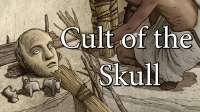 62 Кб, 739x415
62 Кб, 739x415>You put too much import on Sumer-Akkad-Semitic (and let it be said that Semitic transmigratory cultural spirit doesn't shy from slander). They've existed, so what?
Humanity's development was hijacked by a group of clandestine spiritual leaders during the upper paleolithic, who set in motion religious ideas and practices that gave rise to the neolithic revolution and guided our social evolution ever since.
They founded the Neolithic death-obsessed cults of Middle East, from which the belief systems of all the Abrahamic religions descend.
If you've never really thought of these faiths as being obsessed with death, then compare them to non-Semitic religions. Every major world religion has an opinion on the nature of death, but none except the Abrahamic ones make it such a central focus of their doctrine. Hinduism emphasizes suppression of desire to achieve peace in the current life. Taoism is mostly defined by metaphysical speculations having little to do with life or death. European polytheism involved fostering personal virtues, which in combination with sacrificial offerings, would bring the adherent great earthly blessings.
Just as the Ancient Egyptian faith required one to spend his/her entire life preparing for that holiest sacrament of death, only in Judaism and its spinoffs is the focus almost entirely devoted to the temporal nature of the present life, the preparation for the final judgment of Man, and mystical speculations on the afterlife.
The essence of all material and immaterial existence; the undefinable essence both of Matter and of Energy, matter to the coarser, and energy to the finer senses, is God. Not any God to be compared with any personal god, least of all with the ill-tempered, narrow-minded and jealous tribal god Jehovah, created in the image of the jews, but the equivalent of the immanent, impersonal Tat--That--of the Chandogya Upanishad, no less than of das Gott (as opposed to der Gott) of the ancient Germans, and the one conception of Divinity that modern science, far from disproving, on the contrary, suggests.
Such a God can neither “love,” in the all-too-human, Christian sense of the word, nor hate; nor give “commandments” and distribute rewards and punishments in the manner of a human king; nor perform “miracles” if, by such, one means actions in real contradiction with the iron Laws of Nature.
https://m.youtube.com/watch?v=b90oSidoHUY
 62 Кб, 739x415
62 Кб, 739x415>You put too much import on Sumer-Akkad-Semitic (and let it be said that Semitic transmigratory cultural spirit doesn't shy from slander). They've existed, so what?
Humanity's development was hijacked by a group of clandestine spiritual leaders during the upper paleolithic, who set in motion religious ideas and practices that gave rise to the neolithic revolution and guided our social evolution ever since.
They founded the Neolithic death-obsessed cults of Middle East, from which the belief systems of all the Abrahamic religions descend.
If you've never really thought of these faiths as being obsessed with death, then compare them to non-Semitic religions. Every major world religion has an opinion on the nature of death, but none except the Abrahamic ones make it such a central focus of their doctrine. Hinduism emphasizes suppression of desire to achieve peace in the current life. Taoism is mostly defined by metaphysical speculations having little to do with life or death. European polytheism involved fostering personal virtues, which in combination with sacrificial offerings, would bring the adherent great earthly blessings.
Just as the Ancient Egyptian faith required one to spend his/her entire life preparing for that holiest sacrament of death, only in Judaism and its spinoffs is the focus almost entirely devoted to the temporal nature of the present life, the preparation for the final judgment of Man, and mystical speculations on the afterlife.
The essence of all material and immaterial existence; the undefinable essence both of Matter and of Energy, matter to the coarser, and energy to the finer senses, is God. Not any God to be compared with any personal god, least of all with the ill-tempered, narrow-minded and jealous tribal god Jehovah, created in the image of the jews, but the equivalent of the immanent, impersonal Tat--That--of the Chandogya Upanishad, no less than of das Gott (as opposed to der Gott) of the ancient Germans, and the one conception of Divinity that modern science, far from disproving, on the contrary, suggests.
Such a God can neither “love,” in the all-too-human, Christian sense of the word, nor hate; nor give “commandments” and distribute rewards and punishments in the manner of a human king; nor perform “miracles” if, by such, one means actions in real contradiction with the iron Laws of Nature.
https://m.youtube.com/watch?v=b90oSidoHUY
>Humanity's development was hijacked by a group of clandestine spiritual leaders during the upper paleolithic, who set in motion religious ideas and practices that gave rise to the neolithic revolution and guided our social evolution ever since.
You assume too much on there ever being any sort of us. Many things may guide, all those may be not what they seem. Even 'hijack' may have been the most original intention, "Childhood's End" scenario, etc.
>They founded the Neolithic death-obsessed cults of Middle East, from which the belief systems of all the Abrahamic religions descend.
Death is the counter-part of Life. One can fear it, or not, but there is no need to look down on it. It's simply unjust. Death, and agendas of destruction in some sense or purely, of some entities by some entities are not the same.
And seeing as an actual omnipotent entity can have Living Death and Eternal Life dance together (they can do so on their own anyway, omnipotence is there just for logical perspective), there really is no need to worry too much.
>If you've never really thought of these faiths as being obsessed with death, then compare them to non-Semitic religions. Every major world religion has an opinion on the nature of death, but none except the Abrahamic ones make it such a central focus of their doctrine.
It's likely that plenty of actual Christians will disagree with interpretation, but let's roll with that, sure.
All those religions, Christianity included, can be accused of the same 'salvation' pursuit.
>Hinduism emphasizes suppression of desire to achieve peace in the current life.
But what is peace, and why does it matter? Consider that enlightenment typically appears to be a form of inhuman auto-sculpturing, whereupon an interested person strips away parts of their being to reach an 'ideal' self.
But what is that, if not dying? When a person is indoctrinated, losing truth for faith, natural providence of emotion for system integration. A death by any other name, not complete, but just a bit, in exact detail.
>Taoism is mostly defined by metaphysical speculations having little to do with life or death.
Bar exceptions, all things have to do with it, even when they aren't, as those are states of existence and non-existence. Questionable stances on other lifeforms can be implicated as hate against life, for instance.
>European polytheism involved fostering personal virtues, which in combination with sacrificial offerings, would bring the adherent great earthly blessings.
Sacrifices are a transaction-based relationship, which isn't any more different from what you oppose. Under explicit assumption that sacrifices chop up bits of the world and its inhabitants to provide temporary (and possibly ultimately pointless) boons to mortals, all such practices can be considered as Anti-World and Anti-Life. This is only one interpretation even in this assumption, however.
>Just as the Ancient Egyptian faith required one to spend his/her entire life preparing for that holiest sacrament of death
They also had a book of rites for the afterlife, a bizarre thing in itself. This carries implications.
>its spinoffs is the focus almost entirely devoted to the temporal nature of the present life, the preparation for the final judgment of Man, and mystical speculations on the afterlife.
This is hardly the only escapist, personal responsibility abdicating salvation pursuit there was. It's just more overt.
Either way there are no logical contradictions, because this interpretation too has its place.
>The essence of all material and immaterial existence; the undefinable essence both of Matter and of Energy, matter to the coarser, and energy to the finer senses, is God.
No? The World is The World. You simply try to put things exceeding your scope into a taxonomic box, just like all the rest.
Destroying boundaries to try to reduce an abysmally large thing into one Big Thing will not make it what you want, because The World is the World, and you're, just like all those theological fools, but not like actual specific Others, are a part of its contents.
>Not any God to be compared with any personal god, least of all with the ill-tempered, narrow-minded and jealous tribal god
It is foolish to assume that things are what they look, Anonymous.
And it is even more foolish to presume mise-en-scene and actor's motivations in most emotionally primitive ways. For all you know it's all even worse.
Have you considered that Semitic deities were driven into sin or insanity? [By WHOM?]
>created in the image of the jews
Assuming certain relation like that?
>but the equivalent of the immanent, impersonal Tat--That--of the Chandogya Upanishad, no less than of das Gott (as opposed to der Gott) of the ancient Germans, and the one conception of Divinity that modern science, far from disproving, on the contrary, suggests.
This is nothing more than yet another inhumanity, and yet another death. Reality can support any such entity, regardless of It's any chosen judgements.
>Such a God can neither “love,” in the all-too-human, Christian sense of the word, nor hate; nor give “commandments” and distribute rewards and punishments in the manner of a human king; nor perform “miracles” if, by such, one means actions in real contradiction with the iron Laws of Nature.
And you assume such impotence because...?
The World can do what it deems necessary. Humans possess emotional providence, compassion to all life was always part of that. The World and et al share same commonality, but differ in purposes.
Regardless, humans are born without any religion, and none of your at least somewhat valid concerns concern HGs, as current state of reality is ultimately, regardless of any external influence interceding on humanity, due to HG and AGC tactics evolution.
It is debatable that humanity in those earliest era was an entity of love and peace, that was by necessity derailed by someone, something or protrusions of Universal Consciousness. It simply existed in a configuration that worked at the time, until humans acquired certain... hungers.
>Humanity's development was hijacked by a group of clandestine spiritual leaders during the upper paleolithic, who set in motion religious ideas and practices that gave rise to the neolithic revolution and guided our social evolution ever since.
You assume too much on there ever being any sort of us. Many things may guide, all those may be not what they seem. Even 'hijack' may have been the most original intention, "Childhood's End" scenario, etc.
>They founded the Neolithic death-obsessed cults of Middle East, from which the belief systems of all the Abrahamic religions descend.
Death is the counter-part of Life. One can fear it, or not, but there is no need to look down on it. It's simply unjust. Death, and agendas of destruction in some sense or purely, of some entities by some entities are not the same.
And seeing as an actual omnipotent entity can have Living Death and Eternal Life dance together (they can do so on their own anyway, omnipotence is there just for logical perspective), there really is no need to worry too much.
>If you've never really thought of these faiths as being obsessed with death, then compare them to non-Semitic religions. Every major world religion has an opinion on the nature of death, but none except the Abrahamic ones make it such a central focus of their doctrine.
It's likely that plenty of actual Christians will disagree with interpretation, but let's roll with that, sure.
All those religions, Christianity included, can be accused of the same 'salvation' pursuit.
>Hinduism emphasizes suppression of desire to achieve peace in the current life.
But what is peace, and why does it matter? Consider that enlightenment typically appears to be a form of inhuman auto-sculpturing, whereupon an interested person strips away parts of their being to reach an 'ideal' self.
But what is that, if not dying? When a person is indoctrinated, losing truth for faith, natural providence of emotion for system integration. A death by any other name, not complete, but just a bit, in exact detail.
>Taoism is mostly defined by metaphysical speculations having little to do with life or death.
Bar exceptions, all things have to do with it, even when they aren't, as those are states of existence and non-existence. Questionable stances on other lifeforms can be implicated as hate against life, for instance.
>European polytheism involved fostering personal virtues, which in combination with sacrificial offerings, would bring the adherent great earthly blessings.
Sacrifices are a transaction-based relationship, which isn't any more different from what you oppose. Under explicit assumption that sacrifices chop up bits of the world and its inhabitants to provide temporary (and possibly ultimately pointless) boons to mortals, all such practices can be considered as Anti-World and Anti-Life. This is only one interpretation even in this assumption, however.
>Just as the Ancient Egyptian faith required one to spend his/her entire life preparing for that holiest sacrament of death
They also had a book of rites for the afterlife, a bizarre thing in itself. This carries implications.
>its spinoffs is the focus almost entirely devoted to the temporal nature of the present life, the preparation for the final judgment of Man, and mystical speculations on the afterlife.
This is hardly the only escapist, personal responsibility abdicating salvation pursuit there was. It's just more overt.
Either way there are no logical contradictions, because this interpretation too has its place.
>The essence of all material and immaterial existence; the undefinable essence both of Matter and of Energy, matter to the coarser, and energy to the finer senses, is God.
No? The World is The World. You simply try to put things exceeding your scope into a taxonomic box, just like all the rest.
Destroying boundaries to try to reduce an abysmally large thing into one Big Thing will not make it what you want, because The World is the World, and you're, just like all those theological fools, but not like actual specific Others, are a part of its contents.
>Not any God to be compared with any personal god, least of all with the ill-tempered, narrow-minded and jealous tribal god
It is foolish to assume that things are what they look, Anonymous.
And it is even more foolish to presume mise-en-scene and actor's motivations in most emotionally primitive ways. For all you know it's all even worse.
Have you considered that Semitic deities were driven into sin or insanity? [By WHOM?]
>created in the image of the jews
Assuming certain relation like that?
>but the equivalent of the immanent, impersonal Tat--That--of the Chandogya Upanishad, no less than of das Gott (as opposed to der Gott) of the ancient Germans, and the one conception of Divinity that modern science, far from disproving, on the contrary, suggests.
This is nothing more than yet another inhumanity, and yet another death. Reality can support any such entity, regardless of It's any chosen judgements.
>Such a God can neither “love,” in the all-too-human, Christian sense of the word, nor hate; nor give “commandments” and distribute rewards and punishments in the manner of a human king; nor perform “miracles” if, by such, one means actions in real contradiction with the iron Laws of Nature.
And you assume such impotence because...?
The World can do what it deems necessary. Humans possess emotional providence, compassion to all life was always part of that. The World and et al share same commonality, but differ in purposes.
Regardless, humans are born without any religion, and none of your at least somewhat valid concerns concern HGs, as current state of reality is ultimately, regardless of any external influence interceding on humanity, due to HG and AGC tactics evolution.
It is debatable that humanity in those earliest era was an entity of love and peace, that was by necessity derailed by someone, something or protrusions of Universal Consciousness. It simply existed in a configuration that worked at the time, until humans acquired certain... hungers.
>Such a God can neither “love,” in the all-too-human, Christian sense of the word, nor hate; nor give “commandments” and distribute rewards and punishments in the manner of a human king; nor perform “miracles” if, by such, one means actions in real contradiction with the iron Laws of Nature.
More than that, have you considered that the World may actually incarnate deities? And that all those entities, Semitic included, are children of the World?
Children can be unruly. And when your kids possess awesome power, well...
Blonde female (race), state exam (mmm clever), big ass (hunter-gatherers like those).
Sharp eye!
Indeed, paint bucket you see on the far table has no business in apparent math class.



